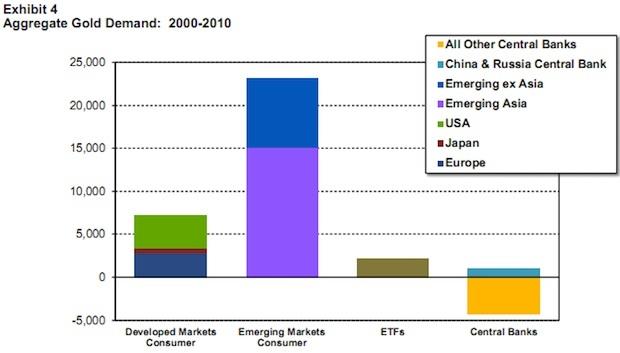Gold prices driven by Asia, not inflation
Gold prices have been in a powerful bull market for the past decade, a phenomenon usually attributed to investors seeking protection against inflation. But that theory appears to be wrong, according to new research by Boston-based money manager GMO. The firm, led by legendary investor Jeremy Grantham, concludes that gold prices are largely being driven by demand from consumers in emerging markets.
"The prevailing view is that the rapid rise of gold prices over the past 10 years has been caused by monetary authorities in the developed world debasing their currencies," write GMO analysts Amit Bhartia and Matt Seto in a new white paper.
As central banks "print" money, the thinking goes, investors in the developed world have hedged inflation risk by pouring money into gold, both in the form of direct purchases and through exchange-traded funds.
Investors flock to savings, checking accounts
Are stocks set for a terrible 10-year run?
Investors' crash fears good news for stocks
But conventional wisdom has it wrong, the GMO analysts write: "Gold purchases over the past 10 years have been derived increasingly from emerging markets, especially emerging Asian countries (with India, China, and Vietnam accounting for the bulk of the increase in demand)."
In 1999, emerging Asia accounted for only 39 percent of global gold demand, Bhartia and Seto note. By 2010, that figure hit 57 percent and has continued to rise. The increase in demand has been concomitant with the rising price of the precious metal.
At the same time, demand for gold among emerging market consumers has far outpaced investment demand through ETFs or direct purchases in the developed world. See the chart, courtesy of GMO, below:
"The data show that the bets against the Federal Reserve, at least in the form of ETF purchases over the past decade, were a relatively small part of the total demand," the analysts write. "Instead, the really big bets were of a different flavor and originated almost entirely in emerging markets."
That's largely due to "financial repression" against Chinese and Indian savers and investors, the analysts write. Residents of those countries have fewer options when it comes to finding ways to generate positive returns on their assets. Bank deposits offer paltry yields and equity markets have been volatile.
As a result, gold jewelry and gold bars, along with real estate, have become the most prominent options among few alternatives, the analysts note.
Bhartia and Seto make no claim to predicting the future price of the precious metal. They only say investors need to be aware that emerging markets represent a significant factor in how gold is being priced now -- and how it will continue to be priced in the future.
